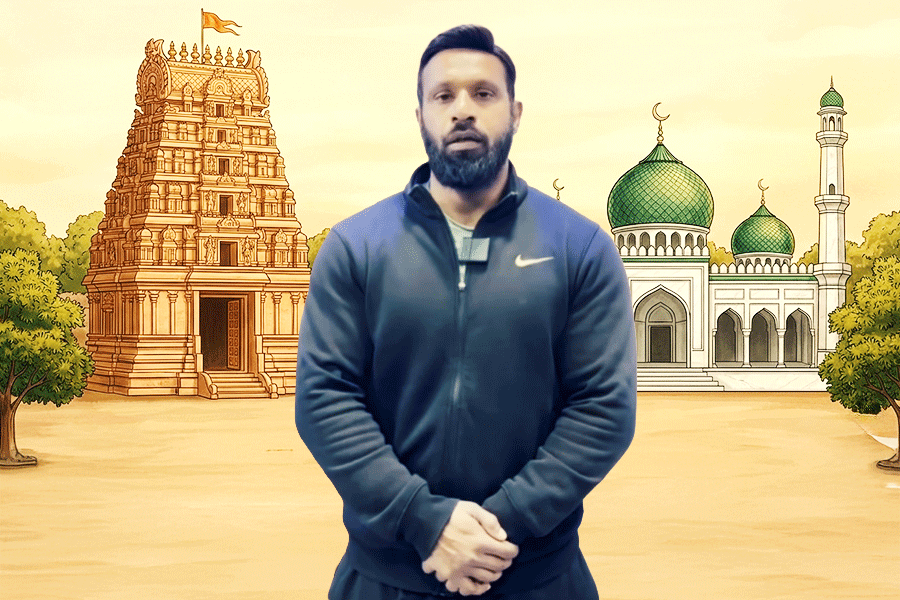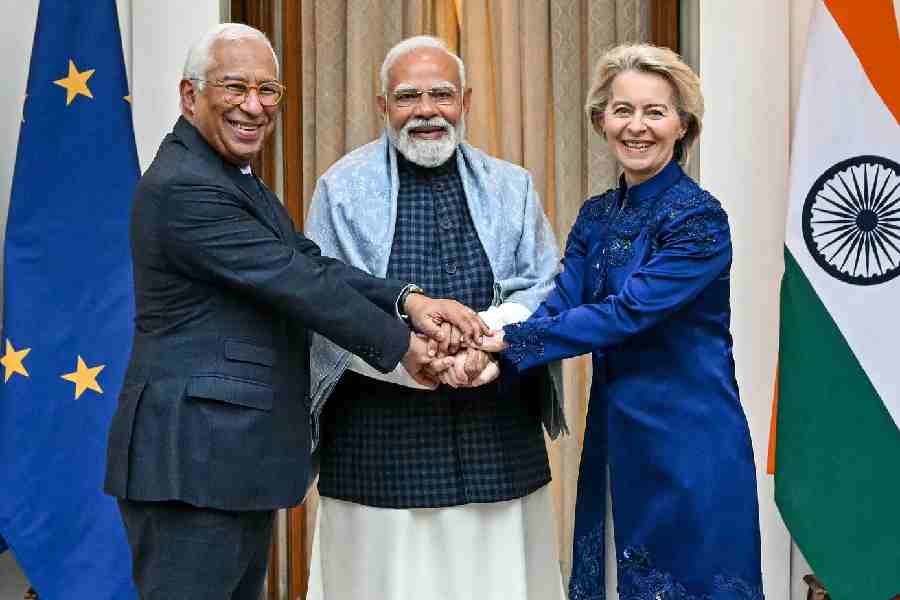
She comes from the Northeast, which is “almost ignored by the national consciousness”, while her first book is about becoming a tree, “a life without worries for the future or regret for the past”, her second book is on a woman going missing trying to find a missing girl. Sumana Roy spoke about her books — How I Became a Tree and Missing — before a select audience at An Author’s Afternoon — presented by Shree Cement and Taj Bengal, held in association with t2, Prabha Khaitan Foundation and literary agency Siyahi — at the Alipore star hotel. In conversation with the 43-year-old writer was Swati Gautam, a lingerie designer. Excerpts from Sumana speak...

Relationship with Siliguri
When I was very young and there was only Doordarshan. My brother, who is two years younger to me, and I used to feel very deprived for never being able to hear Siliguri being mentioned on national television. In 1988, my father had taken the two of us to the matches at Nehru Cup in Siliguri, after work. One day we switched on the television and Gitanjali Aiyar mentioned Siliguri. My brother and I were anxious, almost sweaty with disbelief that it could really be uttered. It was almost like as if we had become legitimate. I didn’t realise it then, since I was in Class VIII, that this had to do something with national consciousness. She (Gitanjali) mentioned the score, the fact that it had taken place in Siliguri, that the game was between Poland and Russia and the names of the two goalscorers. It wasn’t enough for me. I wanted her to say about the fact that we had sweated and those paper caps that we were wearing were slipping down all the time… none of that was described.
After that I came to study in Pratt Memorial School for my Plus 2 and I felt excluded again. I was staying in the boarding and I had lovely friends and there was no feeling of outsider but there was a feeling of being slightly illegitimate because I had no sense of my family tree and everyone here seem to be related to Ray or Tagore or Aparna Sen (laugh) and I only knew the name of my grandfather.
Gradually I came to terms with the fact that Siliguri was unremarkable and I feel grateful for that, it is an extension of someone like me, who is content to be ordinary. So, my relationship with Siliguri comes from that space. Its unremarkableness and ordinariness and I love that very much.
How I Became a Tree is almost a culmination of the life experiences I had been through. This was around 2009 or 2010, I was going through a difficult time in my marriage and with other relationships in my life. I wanted to escape the emotional economy of human life. I wanted to be something that does not have emotions. Could I be a ceiling fan? I thought, no, I don’t want to be a machine. Could I be a dog? I realised that even a dog has emotions. So what could I be? At that point I thought I was giving more than what I got. Therefore I thought the only possibility open for me is to live like a tree, because the tree gives without waiting for what we are giving it back.
I began to wonder whether I was abnormal in harbouring such an ambition. Was I the only one who wanted to become a tree? I began looking for people who had exhibited similar desires. I thought Siddhartha left his wife and son in the middle of the night, walking for miles and then he decides to sit under a tree and the tree transforms him. So there must be something about a tree. I chanced upon the work of scientist Jagdish Chandra Bose, who discovered that plants are living beings. I found in his research essays where he was referring to plant life as children. I soon discovered that like me, he was childless or child-free. So was there a connection that people who did not have children or chosen not to have children felt differently for plant life than those who had children? Or is it possible to be a mother to a plant?
Writing Missing
I began writing Missing in July 2012. The book is about seven days in the life of a blind poet in Siliguri, whose wife, Kabita, has gone missing. It is based on the events that happened in Guwahati in July 2012 where a young girl was molested. It was while writing it that I realised I was actually going back to the first epic in South Asia... what happens when the wife goes missing? For me, in the Ramayana, the wife, Sita, went missing and everything that happened is because of that. I realised that the epics — Ramayana, Iliad and Odyssey — comes from this question. The war that followed when Helen went away. So I thought a woman wasn’t allowed to go and explore other possibilities open to her. I thought that men were allowed to go niruddesh. Siddhartha didn’t know he would become Gautama. Imagine the same thing with Yasodhara. If she had left young Rahul behind, the first criticism would be she was ‘a bad mother’.
I was living and writing about a place from a place that is called the gateway to the Northeast, which is almost ignored by the national consciousness. I remembered drawing the map of India in school, trying to stick agricultural produce from different states, and my mother and I were carrying the map on a rickshaw. By the time I reached school, it fell off and broke. The broken part, I remember, and I can turn it into a metaphor now, was this place where I live. I thought it was very easy to break India over there, if you compare it to the rest of India. This, too, played a role in Missing.
I wanted to create a narrative where we read exactly like we live. The way I eat and relish my food is not the way I consume and ingest news for instance. It’s much faster the way we consume news. I wanted to redress that in Missing.
I tell this to all my students, that all of you have your graduation photographs, but imagine a crow flying through when one of these photographs was being taken. The crow was not supposed to be in the photograph. Now imagine you come back with your children 10 years later, it is very important to identify (the place in) your photograph. You will say, that is the one which has the crow in it. For me the crow is poetic, all the other photographs are news. I think the one that is the most attractive to us is where the poetic resides. That is why we forget news so easily. You forget what your friends posted three days ago, but you remember a moment of affection. That is what I wanted to get back in my life and the novel.
Role of women
The name of the book, Ghare Baire, is important because it implies the home and the world. The woman is supposed to be the angel in the house. Anyone who goes outside becomes impure as it were. Though we think of ourselves as being progressive, technology has helped in emphasising the angle of the house figure. Women would go to the temple to worship; the fact that the replica of the temple, thakur ghar, had to be created in the house, so that the woman did not need to go out of the house.
Had Sita died she would not have had to go through this trial. No man who has gone niruddesh has needed to go through this trial.
Marriage for millennial
Staying with millennials for a significant period of time last year and again this year has helped me to realise that if not with their generation, maybe with their grandchildren, the institution of marriage as we understand it now will not remain.
None of them I interacted with wanted to get married. They were very happy in their relationships and they lived in the moment. I am 43 years old, so I am used to thinking of relationships in a certain way. I would tease them asking, ‘When will you get married? Will you invite me?’ They would laugh at me because they have not contemplated marriage at all.
I have been teaching a poetry workshop at Ashoka University (Delhi) and I had to share a flat with two millennials. Also, I was teaching these millennials. I don’t know what they learnt from me, but what I learnt from them was that the notion of ‘romance forever’ had changed for them. For example, how after a breakup they continue to remain very good friends with the person. This, I thought, was a lesson for my generation.
Also, the heart is very elastic. We say, “I love you and I can not ever love anyone else as much”, and then a child is born to us and we accommodate that child. We tell that child, “I am not going to love anyone as much”. Then another child is born. I think the heart is as accommodative as a paragraph, you can put a lot in it.






Text: Malancha Dasgupta
Pictures: Rashbehari Das










